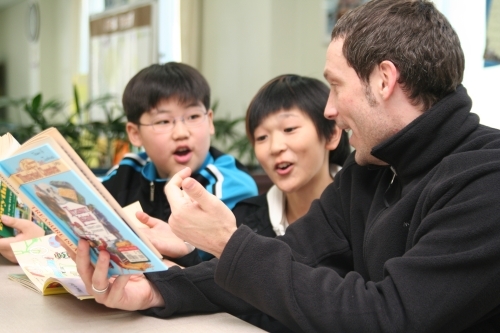Native-speaking teacher cuts slower than expected in Seoul
By Korea HeraldPublished : May 1, 2012 - 18:33
The number of native-speaking English teachers funded by Seoul Ministry of Education has fallen 8 percent, more slowly than previously thought.
Figures provided by the MOE for the beginning of the school year show that the number of native speaking teachers it funds dropped from 1,245 to 1,146. This figure does not cover about 400 teachers directly funded by the schools themselves.
The education office in December announced budget cuts of 4.4 billion won ($3.8 million) as part of plans to drastically cut the number of teachers in its schools, with reports hinting at a 30-40 percent cut in numbers.
Figures provided by the MOE for the beginning of the school year show that the number of native speaking teachers it funds dropped from 1,245 to 1,146. This figure does not cover about 400 teachers directly funded by the schools themselves.
The education office in December announced budget cuts of 4.4 billion won ($3.8 million) as part of plans to drastically cut the number of teachers in its schools, with reports hinting at a 30-40 percent cut in numbers.

This figure was reduced to 2.9 billion won in the final budget, with the office explaining that it would reassign all teachers in high schools to middle and elementary schools at the end of their annual contracts.
The stated aim of the cuts was to improve cost-efficiency in education.
The ministry was quoted as saying native speaking teachers earned an average 42 million won a year. But at this rate the cuts only allow for the reduction of about 52 fully funded teachers.
Figures given for May indicate that native-speaking teachers in Seoul earned a mean average of 28.4 million won. This doesn’t include benefits such as air fares and accommodation, but it’s unlikely these total to an average of more than 11 million won.
The MOE said it had not deviated from its plan, and the figures it provided show the teacher reductions fall mostly in high schools, which had 190 native speaking teachers in March, down from 261 the year before. But many expected more cuts in March, a key hiring season for the teachers.
It was unclear whether these teachers had been replaced by schools funding teachers directly. The Ministry of Education, which collects data on all the schools, said the figures would not be available until June or July.
However, of the 261 employed last year, only 11 native speakers were partly funded by other sources, such as school budgets and gu offices, with the rest entirely funded by the educational office. This is much smaller than at other levels. In elementary, more than 40 percent of the teachers are partly paid for by other means.
This makes it both more cost-effective for the MOE to cut high school teachers, and more difficult for high schools to find alternative funding.
The office said in December that Korean teachers capable of doing the same job were both preferred by students and a more effective use of funds.
Whether this is realistic is a matter of debate. Many foreign English teachers and some trainers of English have said that the language abilities of teachers were not sufficient to offer this, although this opinion appears more strongly held outside the capital.
Kevin Traynor, coordinator of the Intensive English Teacher Training Program at Seoul National University, which was set up by the MOE, said that the office’s plan was reasonable, at least for high schools.
“I think it’s not only realistic, I think its the sensible thing to do,” he said, pointing out that they had better communication and understanding of the students, as well as teacher certification.
“I think if you look at the current curriculum in high school, its getting them ready for the SATs. Most of the classes are actually taught in Korean.”
“The native speakers are kind of in the way based on the current situation.”
But Traynor added that middle schools, which have less grammar focus, might take more time to adapt. He also said that the program was voluntary, so the sample he had experience of might be better than average.
Chan-wook Yang, who works on the same program, said that the language requirements were often overstated.
“When people look at teachers often they’re only thinking about the teachers’ language proficiency but a lot of times you can have a medium level of proficiency but still be able to effectively teach how to use English,” he said.
He pointed out that a lot of young teachers were capable of using new methods, and that the main reason they didn’t do so was because of resistance from the school or their colleagues.
But Yang added that things needed to change for a transition to an all-Korean staff, including a more practical test, and different attitudes to teaching and learning.
“If those things don’t change then getting rid of the native-speaking teachers might not be the best thing to do,” he said.
“I don’t necessarily think the native-speaking teachers are providing everything that’s needed but the things they are providing should stay if those changes aren’t made.”
By Paul Kerry (paulkerry@heraldcorp.com)
-
Articles by Korea Herald









![[Today’s K-pop] BTS pop-up event to come to Seoul](http://res.heraldm.com/phpwas/restmb_idxmake.php?idx=644&simg=/content/image/2024/04/17/20240417050734_0.jpg&u=)
![[Graphic News] More Koreans say they plan long-distance trips this year](http://res.heraldm.com/phpwas/restmb_idxmake.php?idx=644&simg=/content/image/2024/04/17/20240417050828_0.gif&u=)






![[KH Explains] Hyundai's full hybrid edge to pay off amid slow transition to pure EVs](http://res.heraldm.com/phpwas/restmb_idxmake.php?idx=652&simg=/content/image/2024/04/18/20240418050645_0.jpg&u=20240419100350)

